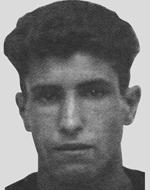Bader’s eldest son and Nuri, the eldest of ten children. Was born on 10.8.1984 in the Bedouin city of Rahat to a large and magnificent family whose sons serve in the security forces. Tark grew up in the lap of a loving family and had a happy and happy childhood. “Said” was called by relatives, and especially his grandparents, so his father was also nicknamed “Abu Said”. The relations between the entire family were good and warm, but Tark had a special relationship with his brother Muhammad, who was two years younger than him. The two spent a lot of time together, and everyone thought they were twins. Tarek bought his education in various schools in Rahat, and completed his studies successfully, with a full matriculation certificate. He was active and involved in the community center in his city, liked to play soccer, and showed a special interest in martial arts, and his father, who trained him in Karate, noticed his talent and encouraged him to persevere in the field. “As befitting a eldest son in a Bedouin family, Tarek was a mature and responsible adult, and used to accompany his father in his work and to help him.” Friends talk about Tariq because he was an optimistic, cheerful, sociable and bright man. Tark loved social gatherings and would make new connections very easily, helping others was one of the values they were invited to He was always able to help the other, whether he was asked to do so and on his own initiative, “he was always trustworthy,” the family members testified, and with the encouragement of his father, Tariq also decided to enlist in the IDF and raise his contribution to the defense of his people and his country. “He wanted to be a combat soldier and to follow the path of a fighter in the Desert Patrol Battalion,” said one of his acquaintances, a Bedouin officer who helped Tarek in his recruitment. Indeed, upon his enlistment, on September 3, 2003, Tarek joined the Desert Patrol Battalion. After training, he continued his advanced training and was sent to serve at the JVT post in Rafah. His commanders testify that he was a dedicated soldier, that he had done what was best done to him and willingly volunteered for every mission. Tariq was calculating and prudent, and always thought a step forward. He rarely spoke of his service in order to spare his mother the concern, and in consideration of his immediate surroundings he avoided entering the city in military garb. Tark was killed in the Gaza Strip in a deadly attack by Palestinian terrorist organizations on December 12, 2004. Tariq was killed by a powerful explosive device planted in a tunnel that was dug A bomb was planted in the tunnel, and the soldiers in the outpost had no chance, and immediately after the explosion, two terrorists ambushed the outpost, firing at the soldiers, who returned fire and killed him. But then explosive devices were detonated on the forces, and massive fire was opened on them What directions. Only after a long while IDF forces were able to rescue the victims. In the combined attack at the JVT outpost, five soldiers were killed and another six injured. The members of the reconnaissance battalion were Sergeant Hussein Abu Lail, Sergeant Aref Azberga, Sergeant Sa’id Ghagha and Sergeant Adham Shehadeh. Fighters who witnessed the incident described the dimensions of the disaster. Lieutenant Colonel Beni Itach, commander of the Desert Patrol Battalion, described what he saw: “The Haganah outpost collapsed, and it was a very difficult sight – blood, personal equipment thrown everywhere.” One of the fighters added: “The sight was shocking, total destruction, the buildings and all that was there – they were simply wiped out. After his fall, Tareq was promoted to sergeant. Thousands accompanied him to eternal rest at the cemetery in Rahat. Tarek left behind his parents and sixteen brothers and sisters,Including a brother who had enlisted in the reconnaissance battalion only four months earlier. A few months after his death Tarek was born another brother. Tark’s estate contained personal letters he had written. Many of them were intended for his father, and expressed the support that Tarek had sought to give him during difficult times. The many photographs left between Tarek’s belongings document the beautiful moments he experienced with his friends, and the hope for a promising future, which was and is not.
